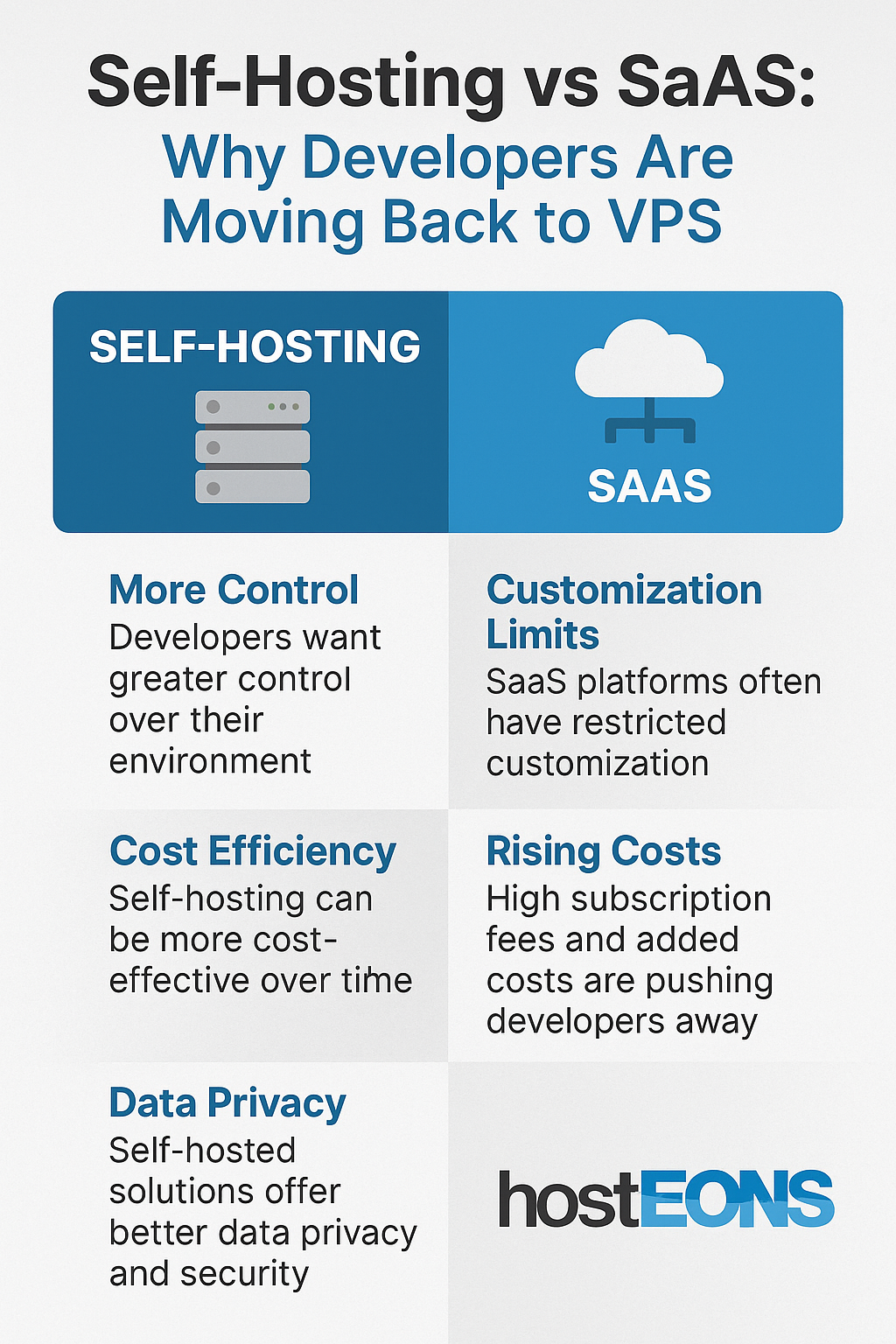
In recent years, Software as a Service (SaaS) has dominated how we consume tools — from CRMs to project managers and even basic email. But in a surprising twist, developers are increasingly ditching SaaS in favor of good old-fashioned self-hosted applications on VPS (Virtual Private Servers).
At HostEONS, we’re seeing a growing wave of developers deploying self-hosted solutions like Nextcloud, Ghost, Outline, Forgejo, Matomo, and more. Here’s why.
🏗️ The SaaS Problem: Convenience with a Cost
SaaS makes it easy to get started — no server configs, no deployment — just log in and go. But that simplicity comes with hidden tradeoffs:
- 💰 High monthly fees
- 🔒 Limited control over data
- 📦 Feature gating and vendor lock-in
- 📉 Performance throttling on lower-tier plans
- 🔕 No control over updates or platform decisions
SaaS is convenient, but you’re renting access, not owning your workflow.
🔁 The Shift: Developers Reclaim Control with Self-Hosting
Today’s developers are tech-savvy and privacy-conscious. Many are turning to VPS-powered self-hosting to take back control — and not just for cost savings.
Here’s why self-hosting is making a comeback:
✅ 1. Full Data Ownership
Self-hosting means your data stays on your terms — not in some multi-tenant cloud environment. Great for:
- GDPR-conscious projects
- Security-focused devs
- Auditable and transparent operations
✅ 2. One-Time Costs, Not Monthly Drain
Most SaaS tools start cheap but scale poorly. Self-hosting on a VPS is:
- Cost-effective
- Predictable
- Scalable without high license jumps
You pay for what you use — not for every user or feature toggle.
✅ 3. Customizability
Open-source, self-hosted tools are often highly customizable. Developers can:
- Change UI
- Extend functionality
- Connect to internal systems without API limits
Try doing that on a closed SaaS dashboard.
✅ 4. Learning and Empowerment
Self-hosting helps devs:
- Improve their sysadmin skills
- Master Docker, NGINX, systemd, backups
- Build portable infrastructure knowledge
Perfect for freelancers, devops engineers, and indie hackers.
✅ 5. Tool Independence
SaaS services can get acquired, shut down, or pivot. With self-hosting:
- You’re in control of updates and versioning
- You’re not forced into UI overhauls or “enterprise upgrades”
- You can run the exact version you want — forever
🧰 What Developers Are Hosting on VPS
Some popular self-hosted apps we’ve seen deployed on HostEONS VPS plans include:
- 🚀 Nextcloud (cloud storage & collaboration)
- 📝 Ghost (blog/CMS)
- 🧠 Outline or Logseq (internal wikis)
- 📈 Matomo (privacy-first analytics)
- 📦 Forgejo / Gitea (self-hosted Git platforms)
- 💬 Rocket.Chat / Mattermost (chat servers)
- 📂 FileRun or Seafile (file sharing)
- 🌍 OpenVPN / WireGuard (self-hosted VPNs)
Need inspiration? We even wrote a guide on How to Install WordPress on a VPS
🖥️ Why HostEONS for Self-Hosting?
We make it easy for developers to self-host without hassle:
✅ KVM VPS with full root access
✅ Free snapshots & backups
✅ Free Blesta license
✅ 1 Gbps (or 10 Gbps for VDS) port speeds
✅ Locations across the US & EU
✅ Flexible payment options — including crypto, Alipay CN, and local gateways
✅ Affordable yearly plans (starting from $17.99/year)
🧭 Conclusion
SaaS still has its place, but developers are increasingly realizing the power, control, and freedom that comes with self-hosting on a VPS. It’s not just a technical decision — it’s a philosophy of ownership over access.
At HostEONS, we’re proud to power that movement.